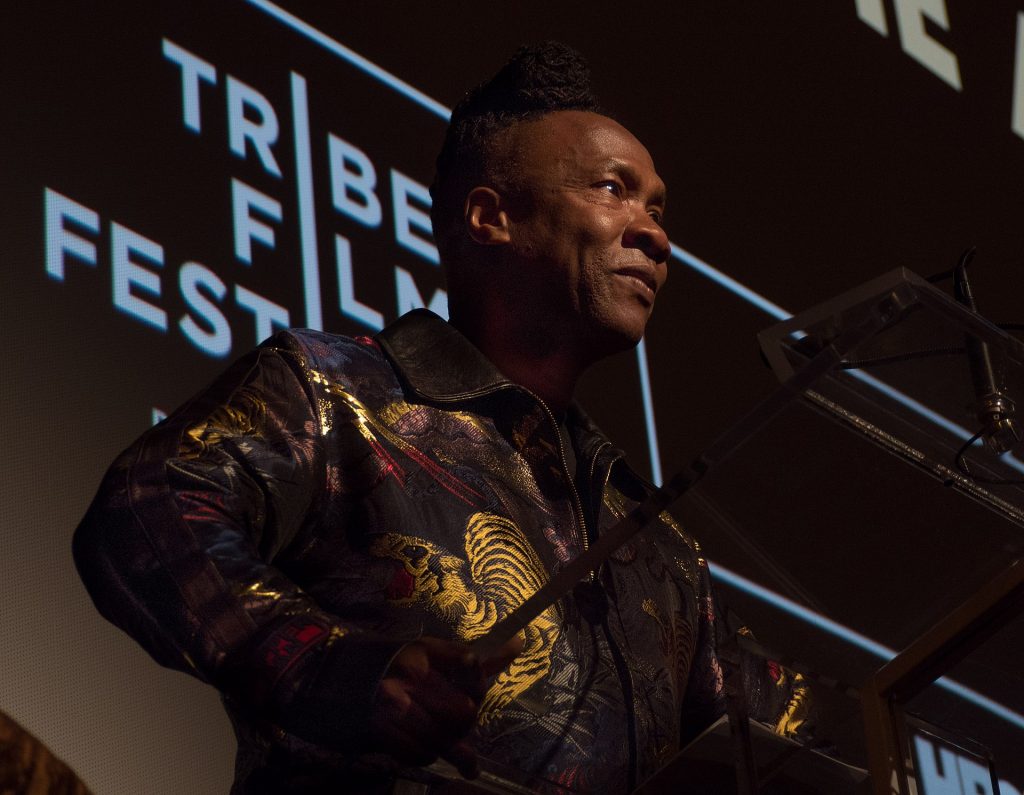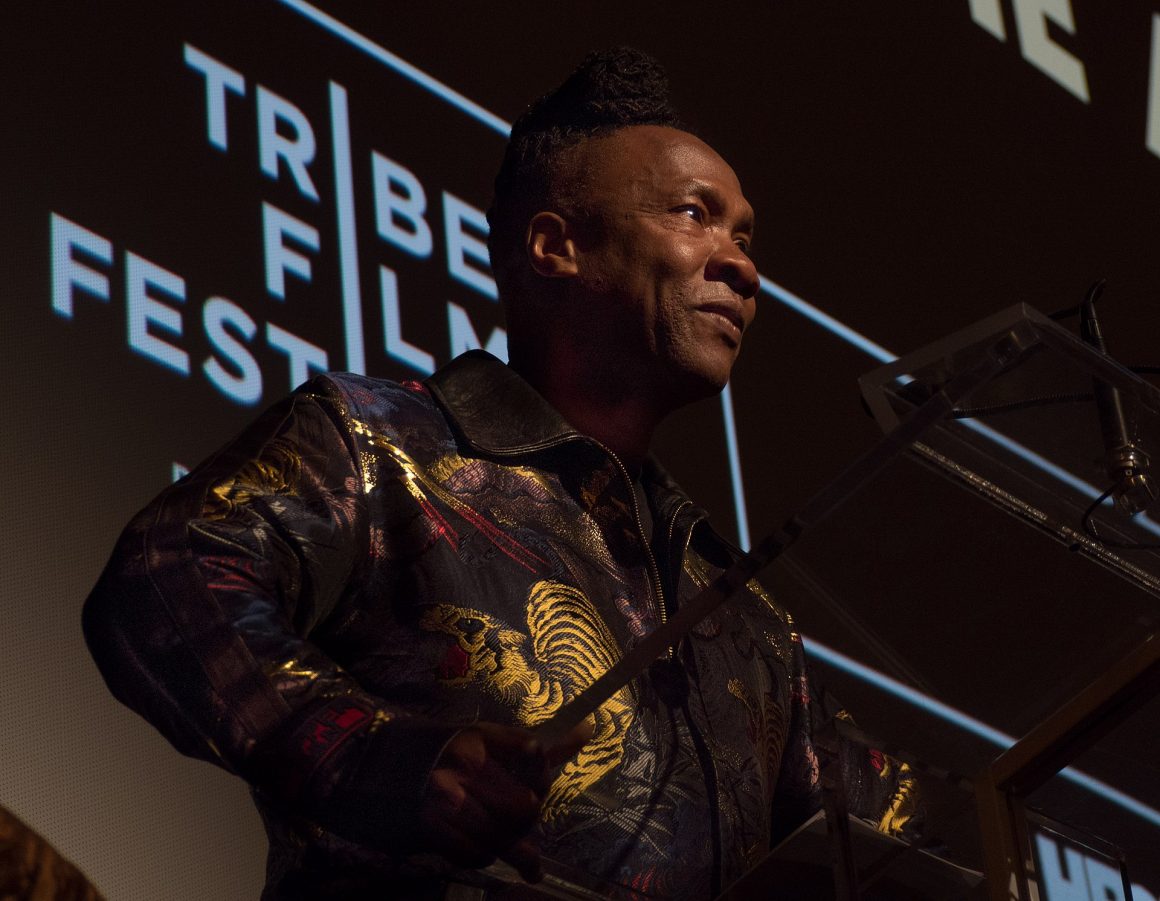
By Matthew Carey | Reposted from Deadline
A few years ago, as filmmaker Roger Ross Williams contemplated founding his own production company, he experienced a Field of Dreams kind of vision: “If you build it, they will come.”
The revelation took place far from the Iowa cornfields of the movie. “I was actually walking by this big, empty office space in Brooklyn,” Williams recalled, “and I thought, ‘Wow, that’s a great office space. I should rent it to start my company.’ I thought that renting the office space would force me to fill it.” Fill it he did, first with edit bays, then with staff. One Story Up has become a thriving enterprise and one of the industry’s few African American-owned production companies. The company name doesn’t refer to a physical location, but to an idea.
“I loved the word ‘story’ being in the name and lifting ‘up’. The two things: lifting up filmmakers of color and telling stories,” Williams says. “I said to myself, I need to use the production company as a vehicle for helping other artists like myself who have felt marginalized and have not had a seat at the table, so to speak.”
Not even winning an Academy Award, seemingly, got Williams a seat at that table. In 2010, he became the first African American director to win an Oscar, for his short documentary Music by Prudence. But he says that accomplishment didn’t unleash a wave of offers.
“The phone wasn’t ringing, no one was calling me,” he says. “I wasn’t getting any jobs.”
He persevered, however, going on to direct several more projects, including a pair of documentary features: God Loves Uganda in 2013 and Life, Animated, which earned an Oscar nomination in 2017. The following year, Williams partnered with a longtime friend, producer Geoff Martz, to launch One Story Up.
“I trusted him, and he had the experience.” Williams says of Martz. “The first thing we did was the series The Innocence Files for Netflix. I directed the first three episodes of that, and that was the first use of this office space.”
Williams says One Story Up currently has “14 or so” projects in various stages of completion, including films and series. When we spoke, he was on the set of Stamped From the Beginning, a hybrid documentary-scripted feature for Netflix based on the bestselling book by Ibram X. Kendi.
“I’m in the studio now shooting on a green screen stage, doing test shots with actors,” he says, explaining that it’s part of a brisk production schedule. “Late next year, basically, I will have three feature films come out, and it just happened like that because the pandemic delayed things. It’ll be a scripted feature, a documentary feature and a hybrid. Covering all the ground there.”

His scripted independent feature, Cassandro, stars Gael García Bernal in the real-life story of Saúl Armendáriz, a gay amateur wrestler in El Paso, Texas, who grappled in drag as the character El Exotico. “I shot that last summer in the middle of the pandemic in Mexico City,” Williams says. “It’s a world that is so colorful and fascinating. It’s a very inspiring film, and Gael is fantastic.”
Williams is working on a documentary about the late singer Donna Summer, co-directing with Summer’s daughter Brooklyn Sudano. Among other projects, he is producing The Empire of Ebony, a documentary directed by Lisa Cortés on the pioneering Black media company Johnson Publishing, which founded Ebony and Jet magazines. And he is embarking on a documentary series for Hulu that is certain to garner huge attention: The 1619 Project, based on journalist Nikole Hannah-Jones’s Pulitzer Prize-winning opus for The New York Times.
Williams will direct the first and last episodes of that series, he says, with One Story Up producing alongside Oprah Winfrey’s Harpo Films, The New York Times, and Lionsgate Television. The series takes an unflinching look at the history and legacy of slavery in America and how systemic racism persists in public and private institutions.
“It was really important to Nikole Hannah-Jones that The 1619 Project was in the hands of African American creators who continue to live the experience of what The 1619 Project is about,” Williams says. “And it was important to Ibram X. Kendi—whose book How to Be an Antiracist was No. 1 on the New York Times bestseller list all through the racial reckoning after George Floyd—that it was a majority African American-owned production company and a Black creator who he would entrust his work to.”
Conservatives have attacked The 1619 Project as well as Kendi’s work; Republican Sen. Ted Cruz of Texas name-checked both of them during the recent U.S. Supreme Court confirmation hearings of Judge Ketanji Brown Jackson.
“Ted Cruz holds up Kendi’s book Antiracist Baby [during the hearing] and I thought, ‘Well, I must be doing something right,’” Williams laughs. “If [works from] two people I revere—Dr. Ibram X. Kendi and Nikole Hannah-Jones—are One Story Up projects, I am doing something right. It was a sad moment for America [to see Sen. Cruz denigrate them], but a proud moment for me in that I get to tell these really important stories. And I don’t take that lightly. I don’t take that for granted for one second.”
He adds, “This country, in my view, is in crisis… We need to discuss and come to terms with certain things around race and certainly slavery. And I hope that people will sit and watch The 1619 Project with an open mind and be able to learn and take in the facts, because they are facts. There’s no fiction, just facts in 1619. And there’s a lot of great people in that series. And the same with Stamped From the Beginning. These are historical facts. People will want to call it fiction for their own convenience, but it’s historical fact.”
Opening doors for others has made Williams a disruptor in the business. He doesn’t shy away from the term. Far from it. “Yes, I am a disruptor for sure,” he says. “Proudly, proudly.”
That applies to his time serving on the Board of Governors of the Motion Picture Academy. He was elected to the first of two consecutive terms in 2016, representing the Documentary Branch.
“I walked into that room the first time and I remember it very clearly,” Williams says of his initial Board of Governors gathering. “The only other person of color was (then Academy president) Cheryl Boone Isaacs. I remember I saw Tom Hanks sitting at the table and Steven Spielberg. There were some women, of course, but mostly white men. And I thought, How did I get into this room? I just couldn’t believe it. I thought, OK, well, you can just sort of sit there or you can disrupt the Academy. And the way I could do that is within my own branch.”

In 2016, under the leadership of Boone Isaacs, the Academy launched its A2020 initiative, “to double the number of women and underrepresented ethnic/racial communities and significantly grow its international membership by 2020.” Williams took that goal and ran with it.
“I set out to bring in a large number of people of color. You could count on one hand the number of Latino members when I joined; two hands, maybe, the number of African American members, and a very small international [contingent],” he says. “And now the documentary branch is a third international. We’re the first branch to go from gender non-parity to gender parity. And we have an incredible amount of BIPOC members. We still have a lot of work to do, but we are the most diverse branch in the Academy. The Academy acknowledges that. They said we are the gold standard, the doc branch, and I’m very proud of that work over the last six years. I’m very proud that we set an example for the other branches. And that’s what I mean by being a disruptor. That’s what I want to do. That’s my purpose.”
His goal with One Story Up is to continue providing space for BIPOC talent to blossom. Case in point, Master of Light, a documentary directed by Rosa Boesten about the extraordinary artist George Anthony Morton. In March, the film won the Grand Jury Prize at SXSW.
“Everyone who worked on that project, Rosa, first-time queer filmmaker, to Ephraim Kirkwood, first-time Black editor, to Francesca Sharper, who’s the associate editor, her first feature film, Jurgen Lisse, the DP from Surinam… All these first-time people of color, and their film wins the Grand Jury Prize,” Williams says. “What does that tell you? That if you give opportunities to people of color, to BIPOC filmmakers, they will shine, they will win, they will create great content, and tell great, positive stories about uplifting and positive characters like George. That win was just like a stamp of approval of what Geoff and I have created at One Story Up.”
Another recent stamp of approval came with the Peabody Award nomination for One Story Up’s Netflix docuseries High on the Hog: How African American Cuisine Transformed America, directed by Williams, Jonathan Clasberry and Yoruba Richen.
In a few short years, the company has gone from startup to major force, supplying content to Netflix, HBO, Hulu, and A&E, among others. “One Story Up has just exploded, cultivating all this new talent,” Williams says. “We’ve gotten so big over the last three years,
[we have]a hundred people working for us.”
And with that expansion comes a challenge. “We’ve outgrown our location,” Williams says. “So now I’m looking for new office space.”
That much quoted maxim from the motion picture may serve him well once again: “If you build it, they will come.”

